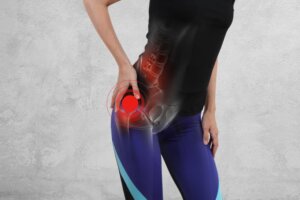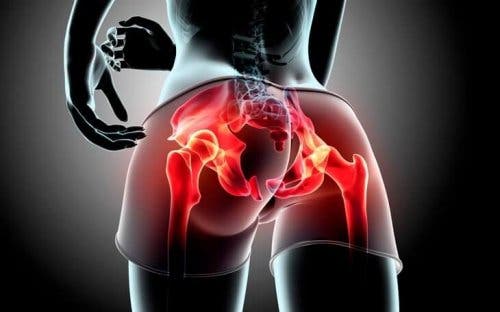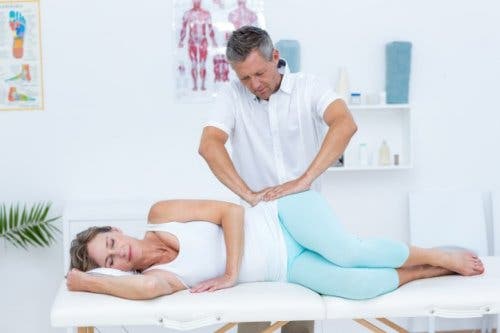What Is Gluteal Tendinopathy?

Gluteal tendinopathy, also known as “trochanteric bursitis”, is one of the causes of hip pain. It’s caused by inflammation in the tendons of the area, which can be caused by different factors. Why does this type of bursitis arise? How can you fix it?
Gluteal tendinopathy is usually caused by repeated microtrauma. For this reason, many athletes, such as marathon runners, tend to suffer from this condition.
The constant rubbing of the area causes it to suffer and the serous bags (bursa) become inflamed. However, you don’t have to be an athlete to suffer from trochanteric bursitis. There are other factors that can cause it to appear.
Who can have gluteal tendinopathy?

Being an athlete, running marathons or playing soccer can predispose you to trochanteric bursitis. However, there are other factors that can make you susceptible to it. Let’s take a look at some of them that, with proper treatment, can prevent this condition from making an appearance.
- Obesity. The pressure in the area due to excess fat can make bursitis appear more easily.
- Fibromyalgia. The muscle stiffness from this disease can cause rubbing of the area and cause gluteal tendinopathy.
- Hip arthritis. Without a doubt, this problem that causes inflammation of the joints in the area can promote the appearance of trochanteric bursitis.
- Gonarthrosis. Cartilage degeneration can cause this type of tendinopathy to appear.
If you have any of these factors, you may have a higher chance of suffering it, although this doesn’t mean that you definitely will. However, you need to know what the symptoms are that alert you to its appearance.
You may be interested in: Where Does a Stress Fracture Occur?
Gluteal tendinopathy symptoms

When you suffer from gluteal tendinopathy, you’ll experience a series of symptoms that, perhaps, can be confused with other types of problems.
Therefore, although the discomfort may not be very serious at first, we always recommend going to a health professional. That way, you can keep the discomfort from increasing over time. In addition, you can start treatment as soon as possible so that your condition doesn’t get worse. Below are some of the common symptoms:
- Clicking and pain in the area
- Joint stiffness in the area
- Difficulty walking without noticing discomfort
- Pain that extends to the front of the thigh
- A feeling of pain that reaches the inner thigh
- Pain close to the ischial tuberosity (sit bones) that extends to the buttocks
As you can see, pain in the area is the main symptom that appears, sometimes accompanied by a click.
Whether it extends to the front, back, or inside of the thigh, and sometimes even to the knee, will depend on the activities or movements that cause friction and inflammation of the bursa.
For example, patients who often experience groin pain that extends to the front of the thigh experience it when they hyper-extend the hip. Also, people who spend a lot of time sitting often suffer the last of the symptoms on the list.
Available treatments

When doctors diagnose a patient with gluteal tendinopathy (by x-ray, ultrasound, gammagraphy, tomography, or MRI), they may recommend weight loss if weight is the cause of the bursitis. However, they may also prescribe analgesics to relieve pain and inflammation.
They also recommend that you do specific exercises that strengthen the buttocks and hips. Likewise, doctors stress the importance of not sleeping on the side where you’re suffering tendinopathy, as this will only make it worse.
In some cases, they might extract liquid from the bursa or inject a mixture of anesthetic and corticosteroids to treat it.
What to do when you have gluteal tendinopathy symptoms?
Now that you know a little more about gluteal tendinopathy, don’t hesitate to go to the doctor for any of the symptoms mentioned in this article.
Your doctor will do the relevant tests so that you can avoid feeling pain and discomfort, as this condition is easily treatable. Have you ever been diagnosed with trochanteric or hip bursitis?
All cited sources were thoroughly reviewed by our team to ensure their quality, reliability, currency, and validity. The bibliography of this article was considered reliable and of academic or scientific accuracy.
- García, M. F., Pérez, C. E., & De Paz, M. P. (2003). Programas de ejercicios en tendinopatías. Rehabilitación, 37(6), 354-362.
- Medrano San Ildefonso, M., Mauri Llerda, J. A., & Bruscas Izu, C.. (2007). Tendinopatías por fluoroquinolonas. Anales de Medicina Interna, 24(5), 227-230. Recuperado en 28 de febrero de 2019, de http://scielo.isciii.es/scielo.php?script=sci_arttext&pid=S0212-71992007000500005&lng=es&tlng=es.
- Pruvost, J. (2012). Tendinopatías del deportista. EMC-Podología, 14(2), 1-10.
- Schvartzman, P., Salgado, D., Buteler, J., Alonso, P., Ríos, A., & Mondello, E.. (2016). Utilidad de la resonancia magnética en el diagnóstico de lesiones musculares de localización atípica. Revista argentina de radiología, 80(1), 27-38. Recuperado en 27 de febrero de 2019, de http://www.scielo.org.ar/scielo.php?script=sci_arttext&pid=S1852-99922016000100005&lng=es&tlng=es.
- Vittecoq O, Lequerré T, Michelin P, Dujardin F. Actitud diagnóstica y tratamiento ante un dolor de cadera en el adulto. EMC – Tratado Med. 2018;
This text is provided for informational purposes only and does not replace consultation with a professional. If in doubt, consult your specialist.








